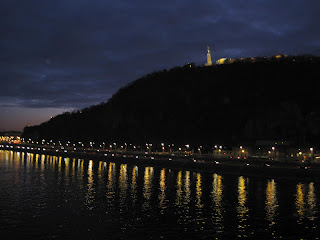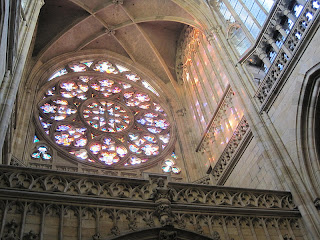 |
| Budapest philharmonic, which has terrible acoustics |
Recently, I went to Budapest with two friends to celebrate a birthday.
Having been to Budapest almost four years ago with a group of Americans (part of a cultural tour to Eastern Europe while I was a student in Berlin), I figured I knew what to expect. In fact, I absolutely LOVED Budapest when I was there in 2007.
What about the city appealed to me? For reasons I have trouble fully explaining, I just liked it. Budapest has been called the "Paris of the East" and, having lived in Paris, I can agree. Not wholeheartedly, but certainly to an extent.
The neoclassical buildings, the picturesque Danube, the romance of the chain bridge at night, the ruined beauty of a lost empire (I had not yet been to Vienna...) intermingled into this portrait of a mysterious and inspired, yet impoverished, capital city. I'm really a sucker for the underdog. Also, there were practically no tourists - especially compared to Berlin and Prague. This especially appealed to me, as a tourist who looks down on other tourists (love it or hate it, I bet you do, too, sometimes!).
 |
| Franz-Josef strikes again! |
This time, however, I can't say I was feeling Budapest. An observation was made to me the other day, that Budapest is Vienna under 60 years of grime (i.e. Communism) and, from my recent experience, I can totally agree. I think I can still appreciate, however, the Hungarian attitude: despite hardships (ones that many former Communist countries have had to deal with), Hungarians are still optimistic and fun-loving - as far as I can tell. Our tour guide Agnes was quite the character.
I have a great admiration for countries - people - who have lived under Communism (and lived through Communism). During my visit to Poland, I picked up Café Europa
by Slavenka Drakulić, a journalist and former inhabitant of the former Yugoslavia. Her style is bitingly witty, poignant and honest. The book is a collection of essays written between 1992 and 1996 about her experiences of, opinions on and wishes for former Communist eastern European states. Though to date I have not finished Café Europa (other things getting in the way, as they seem to do for me), I can tell that what she has to tell me will affect all of my perceptions of eastern Europe - I think it already has.
|
Apparently the spot of "original" love locks - Cologne copied Budapest's idea, according to Anges
|
I went with Stella (who had been this summer) and Jade (who was going for the first time). I think in a way it was a different (interesting?) cultural experience because they are both English, and, despite what we like to think, though England and America seem to be so close to each other in terms of language, culture, mores, etc., we are different, in ways that are often imperceptible.
I think, in fact, I've become more aware of these cultural differences because of my teaching post. Because my teachers ask me all the time, "Is this correct?" or, to read between the lines, "Is this British?" I normally dissent by saying "X is American. Y is British. Both are correct, depending on whom you ask." And
that has saved me a lot of grief in the teacher's room. Not to say one is better than the other is diplomatic, if you ask me. I've actually discovered several teachers (and students) who prefer the American way to the British way, but there are plenty of sticklers who think British is best.

I really couldn't care less, to tell you the truth, how non-native speakers prefer to conduct themselves in English, as long as they don't take personal offense to the fact that I'm American (something, in case you
haven't nocticed, I can't exactly help).
But I do love getting to know different cultures from traveling. Including British cultures (I've been led to believe there are several, from my contacts). And I think this ties in nicely to my point on eastern Europe. It's entirely unfair to judge a culture (for good or bad) until you've experienced it first-hand.


Here ends my rant. Feel free to enjoy the rest of this post rant-free.
From here, there will only be photos :) And minor explanations of the photos, where necessary...

 |
| Stella & Jade on the bridge |
 |
| view from the top of bridge |
 |
| One of my faves: the Plague statue |
 |
| A view of Parliament |
 |
| the Fisherman's Bastion |
 |
| Some King - Stephen? |
 |
| Hungarian flags, presumably for 15 March - Hungarian national holiday |
 |
| The National Museum |




















































